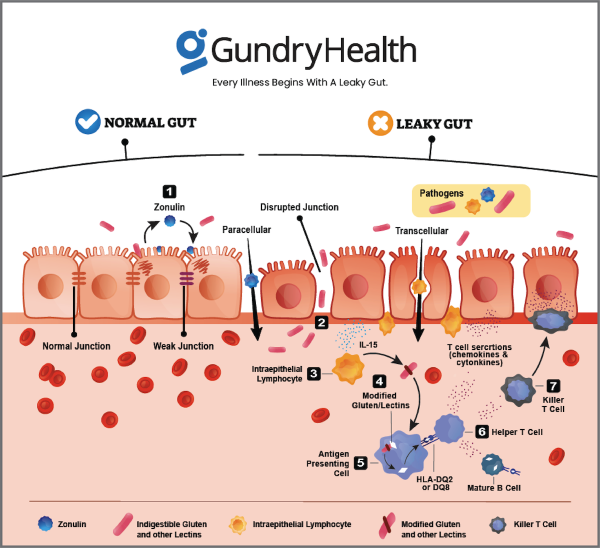Navigating Mixed Connective Tissue Disease (MCTD) at Gundry Health
Mixed Connective Tissue Disease (MCTD) is a multifaceted autoimmune condition that intertwines symptoms from various diseases. It’s a complex landscape that requires specialized care, a type of care that we at Gundry Health are committed to providing.
Understanding MCTD Symptoms
MCTD is an autoimmune disease, which means the body’s immune system attacks its own tissues, causing widespread inflammation and damage. The disease manifests as a combination of symptoms from conditions such as lupus, scleroderma, and polymyositis. The exact cause is unknown, but a blend of genetic and environmental factors are often implicated.
Patients with MCTD may experience a myriad of symptoms. These can range from general fatigue and fever to joint pains and skin rashes on the face, neck, and upper body. Some individuals may also have Raynaud’s phenomenon, where fingers become pale or numb in response to cold temperatures or emotional distress.
Some of common symptoms associated with MCTD:
- Joint Pain and Arthritis: Joint pain and inflammation are common in MCTD. Affected individuals may experience joint stiffness, swelling, and tenderness. Arthritis symptoms can resemble those seen in rheumatoid arthritis.
- Muscle Weakness: Muscle weakness can occur, resembling the symptoms of polymyositis or dermatomyositis. This can lead to difficulties with activities that involve muscle strength, such as lifting objects or climbing stairs.
- Skin Changes: Skin involvement in MCTD can result in various symptoms, including skin rashes, discoloration, and skin tightening. Some individuals may develop a condition similar to scleroderma, with skin thickening and tightening.
- Raynaud’s Phenomenon: Raynaud’s phenomenon is characterized by the fingers and toes becoming white or blue in response to cold or stress. This is caused by the narrowing of small blood vessels (vasospasm) in extremities and is a common feature in MCTD.
- Fatigue: Chronic fatigue is a prevalent symptom in MCTD and can significantly impact a person’s quality of life.
- Fever: Recurrent low-grade fever can occur in MCTD, which may be related to inflammation and immune system activity.
- Lung Involvement: MCTD can affect the lungs, leading to symptoms such as cough, shortness of breath, and inflammation of the lung tissue (interstitial lung disease).
- Heart and Blood Vessel Involvement: In some cases, MCTD can affect the heart and blood vessels, leading to conditions like pericarditis (inflammation of the lining around the heart) or vasculitis (inflammation of blood vessels).
- Digestive Issues: Gastrointestinal problems, such as acid reflux or difficulty swallowing, can occur in MCTD.
- Kidney Involvement: Although less common than in some other autoimmune diseases, MCTD can affect the kidneys, leading to renal complications.
- Neurological Symptoms: Some individuals with MCTD may experience neurological symptoms such as headaches, cognitive difficulties, or peripheral neuropathy (nerve damage).
- Eye Problems: Eye symptoms, including dry eyes, conjunctivitis, or uveitis, can occur.
Diagnosing MCTD at Gundry Health
Diagnosing MCTD is a detailed process that involves a comprehensive understanding of the patient’s medical history, physical examinations, and advanced laboratory tests. At Gundry Health, we utilize state-of-the-art diagnostic tools to identify specific autoantibodies in the blood, a key indicator of MCTD. This multi-faceted approach allows us to capture the full picture of the disease and create a personalized treatment plan.
Treatment and Lifestyle Management
At Gundry Health, our treatment strategy for MCTD is twofold: managing symptoms and slowing disease progression. Depending on the specific symptoms, treatments may involve medications to reduce inflammation, suppress the immune system, or target specific issues like acid reflux or muscle weakness.
However, our care extends beyond pharmacological interventions. We believe in a holistic approach to managing MCTD. We provide guidance on lifestyle modifications, such as a balanced diet and regular exercise, which can help manage symptoms and improve overall well being.
In certain cases, physiotherapy or occupational therapy may be recommended to enhance muscle strength and function. Recognizing the emotional impact of MCTD, we also offer psychological support and counseling to help patients navigate their journey.
At Gundry Health, our mission is not just to treat MCTD, but to empower patients to lead a fulfilling life despite the disease. Through our comprehensive and personalized approach, we strive to enhance the quality of life for those living with MCTD.
Get personalized care and recommendations for Mixed Connective Tissue Disease (MCTD) from Dr Gundry-Approved program
If you’re looking for more guidance about Mixed Connective Tissue Disease (MCTD) than this short list of recommendations, Dr. Gundry’s unique health program is now available to you (without needing an appointment at one of Dr. Gundry’s two, waitlist-only West Coast clinics).
Thanks to the pioneering work of Dr. Gundry and his team at Gundry Health, patient care team trained in Dr. Gundry’s unique holistic methods are now available to help you craft your own personalized Mixed Connective Tissue Disease (MCTD) program.
It’s easy to get started.
Simply click the link below to get more information about personalized Mixed Connective Tissue Disease (MCTD) treatment plan options, so you can get expert analysis, diagnostic care, and a plan for tackling Mixed Connective Tissue Disease (MCTD), arthritis, or other autoimmune diseases.
Each patient care team member at Gundry Health is Board Certified and trained in Dr. Gundry’s renowned approach to functional medicine and care.
Get your personal lab data and talk to a U.S. licensed doctor. Click Here.







